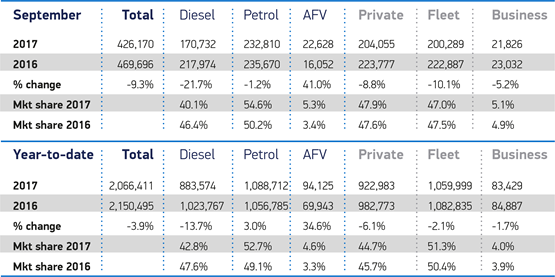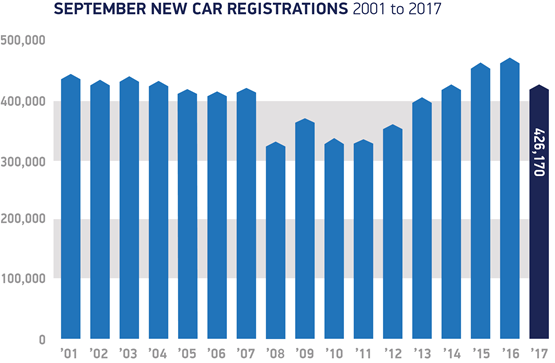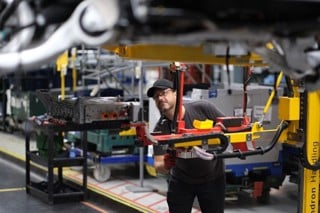Demand for alternatively fuelled vehicles (AFVs) continued to accelerate in September, up 41% in the month and 34.6% year-to-date, with nearly 95,000 leaving forecourts this year.
However, this couldn’t compensate for declines in registrations of petrol cars, down by 1.2%, and, especially, diesel which fell for the sixth consecutive month, down by 21.7%, according to figures from the Society of Motor Manufacturers and Traders (SMMT).
Confusion surrounding air quality plans has inevitably led to a drop in consumer and business demand for diesel vehicles, which is undermining the roll out of the latest low emissions models and thwarting the ambitions of both industry and government to meet challenging CO2 targets, says the SMMT.
Indeed, if new diesel registrations continue on this negative trend, UK average new car CO2 levels could actually rise this year, the first time such an increase would have occurred since average CO2 emissions were recorded.
So far this year 485,067 diesel vehicles have been produced in the UK, and maintaining strong demand for the latest new diesel vehicles is essential for the health of the UK automotive sector that employs over 814,000 people.
Overall, the UK new car market declined for a sixth consecutive month in September, with 426,170 new units registered.
Fleet and business registrations fell by 9.5%, with 222,115 units registered in the month compared to 245,919 cars in September 2016.
However, year-to-date fleet and business registrations are only down by around 2%, with 1,143,428 units registered in the first nine months of 2017, compared to 1,167,722 units for the same period last year.
Mike Hawes, SMMT chief executive, said: “September is always a barometer of the health of the UK new car market so this decline will cause considerable concern.
“Business and political uncertainty is reducing buyer confidence, with consumers and businesses more likely to delay big ticket purchases.
“The confusion surrounding air quality plans has not helped, but consumers should be reassured that all the new diesel and petrol models on the market will not face any bans or additional charges.
“Manufacturers’ scrappage schemes are proving popular and such schemes are to be encouraged given fleet renewal is the best way to address environmental issues in our towns and cities.”
Chris Bosworth, director of strategy at Close Brothers Motor Finance, said: “The past six months has been a turbulent time for the motor industry with France, quickly followed by the UK, banning the sale of petrol and diesel cars by 2040. This is one of the most radical Government policies affecting the automotive sector in recent memory, and the shake up is having an effect.
"Buying behaviour towards fossil fuel cars is changing as motorists lean towards leasing deals rather than purchasing the vehicle outright.”




























Petrol Paul - 05/10/2017 18:30
There is not one issue at play here but three. 1) Diesel is indeed taking punishment for the misdemeanours of its predecessors. The message that Euro 6 is clean and can not be compared older Euro 4 & 5 vehicles is not landing - largely due to the press generalising about diesel. France has introduced an air quality sticker to be applied to all cars that drive in the big cities - we should do the same and then it would become clear that not all diesels are equal. 2) Because of the speed of decline in Diesel not all manufacturers have got viable alternatives - clearly some are better positioned than others. However brands have loyalty and loyal customers who don't see a viable alternative to diesel (whether its needed or not) will simply delay rather then invest in something they see being vilified. Delaying purchasing reduces registrations. 3) There is no doubt in my mind that the reduction is Diesel Registrations is not all down to the poor reputation Diesel is enduring now but to Company Car Drivers (who largely drive diesel) leaving en mass from car schemes as they are being taxed out of company cars. Whilst some will opt for a PCH / PCP on a new vehicle others will just buy a used car for business use. Manufacturing suffers, Tax Revenues suffers, air quality suffers - too much car tax does stifle demand - the Government need to take note!